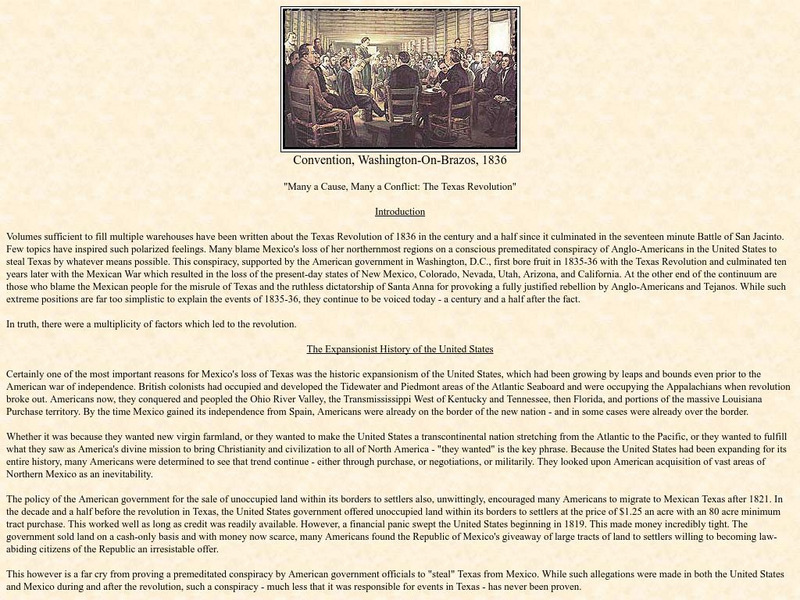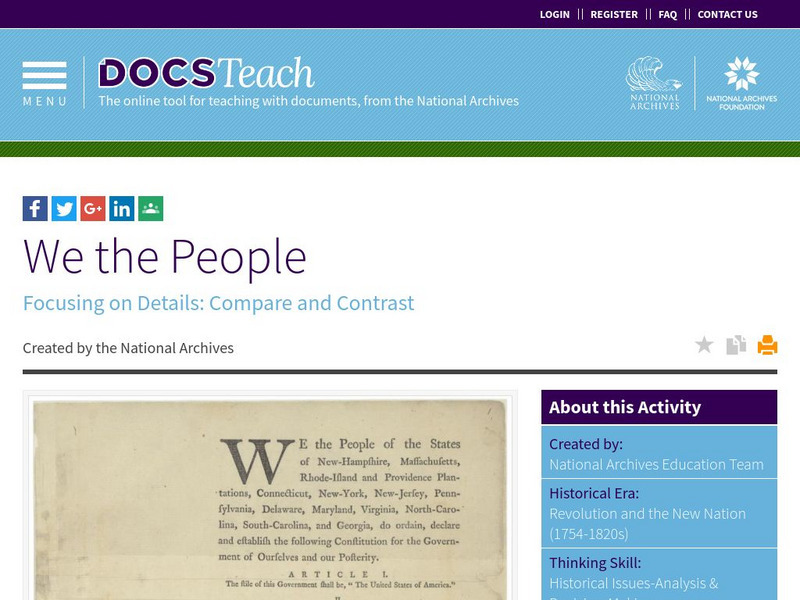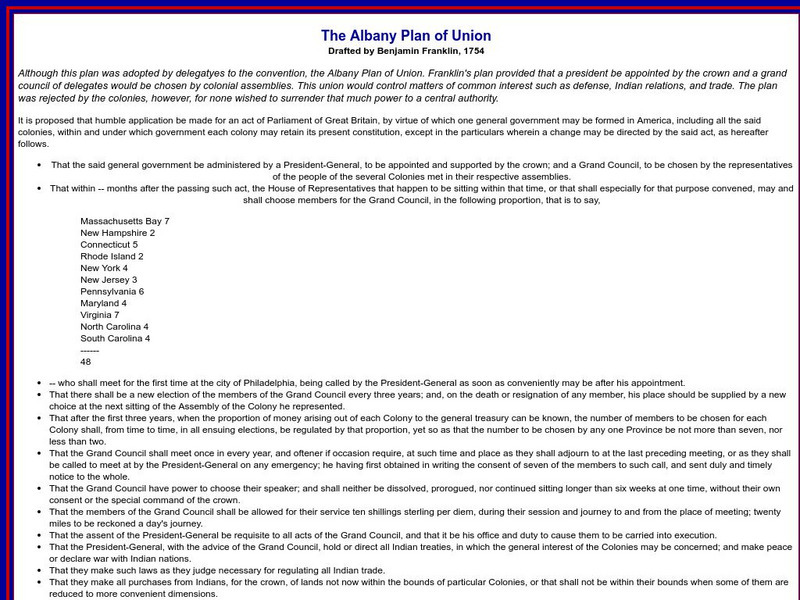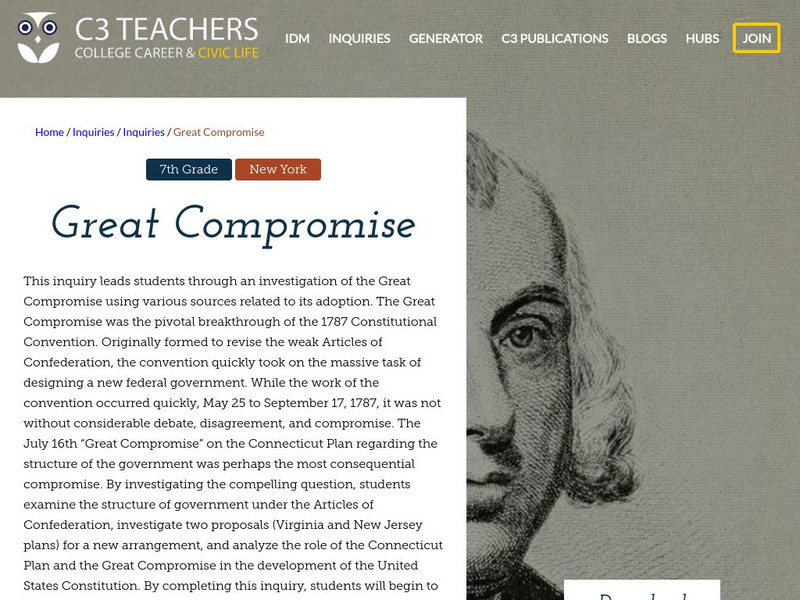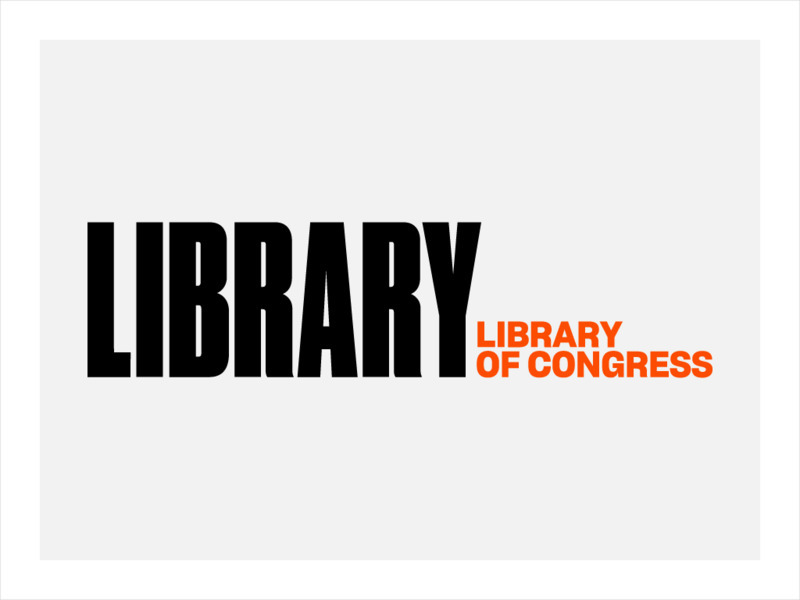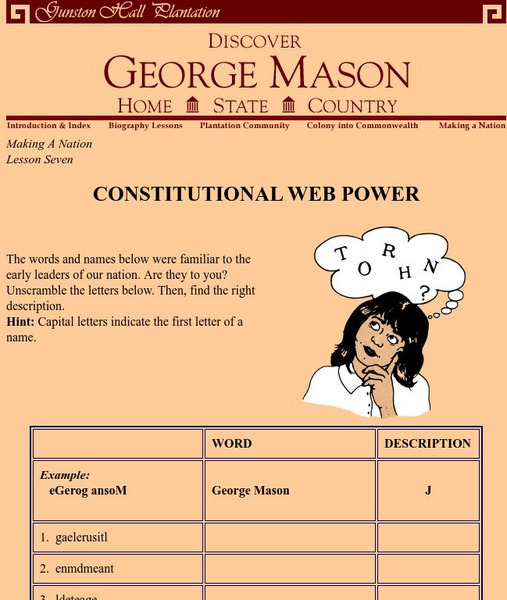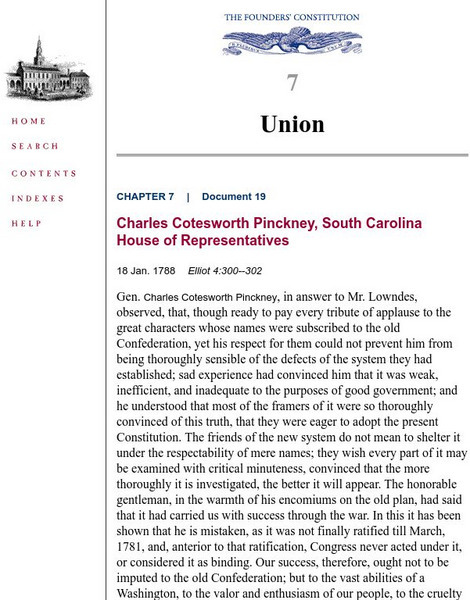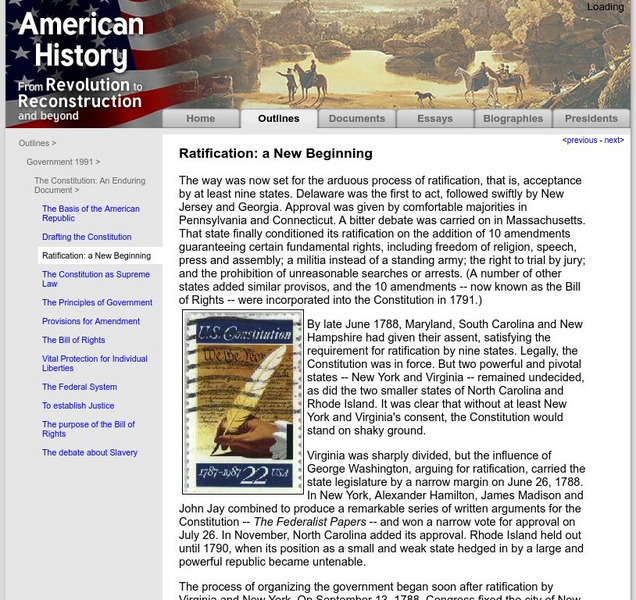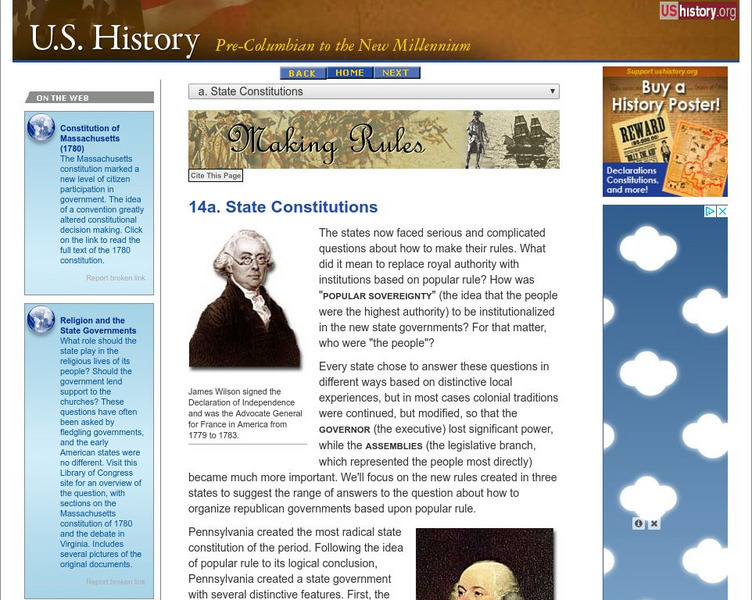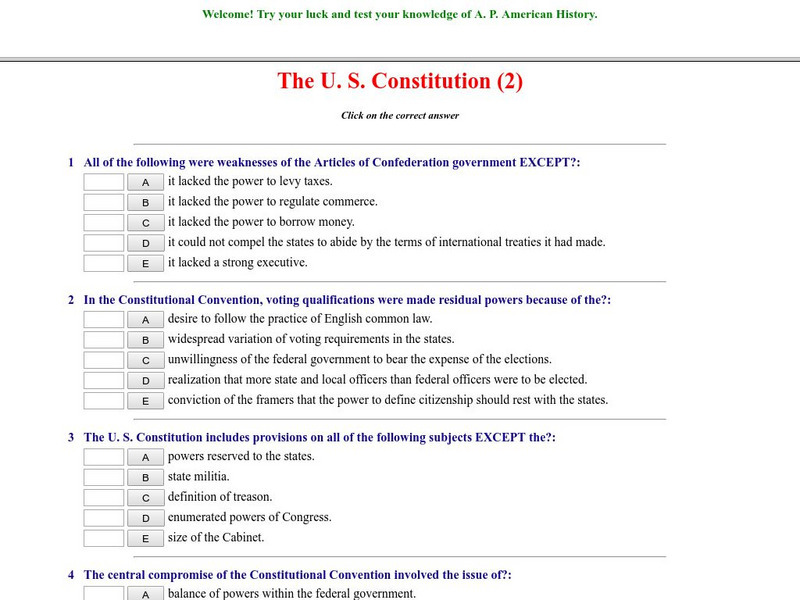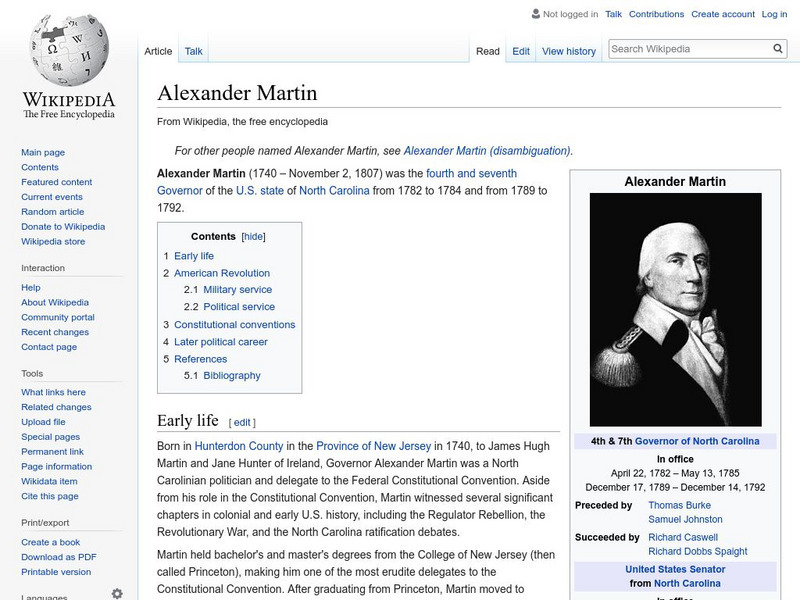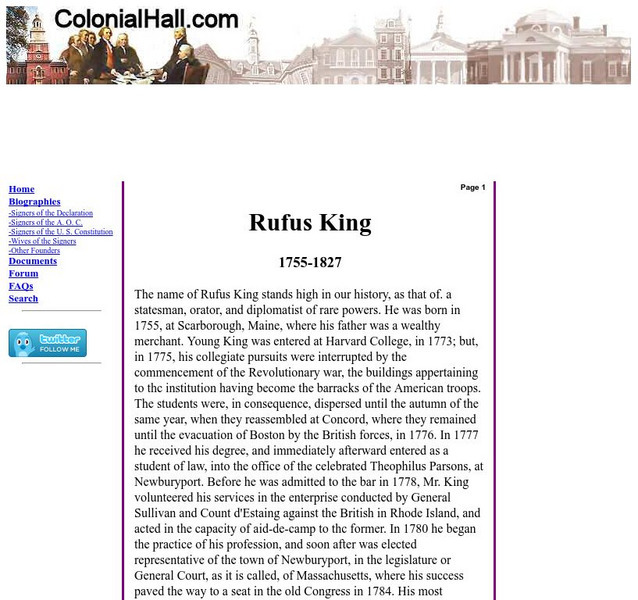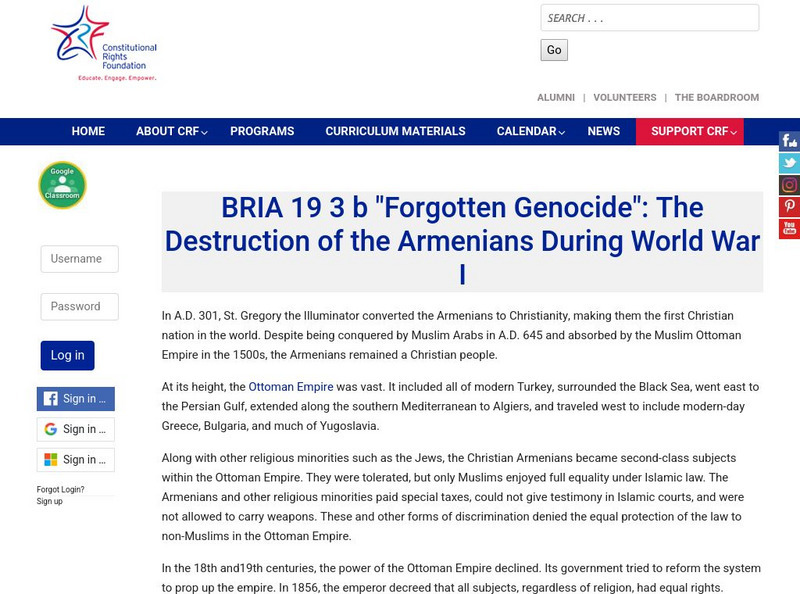Other
Austin Community College District: Convention, Washington on Brazos
A detailed description of the Convention of 1836, a meeting of elected delegates in Washington-on-the-Brazos, Texas shortly after the Texas Revolution began.
The Dirksen Congressional Center
Congress Link: Lesson Plans
The Dirksen Congressional Center provides abundant lesson plans on all aspects of the US Congress and the US Constitution. All lessons contain time frames, objectives, and links to material, and are built around Bloom's taxonomy.
US National Archives
National Archives: We the People
View George Washington's annotated draft of the Constitution while discussing the ratification process. Specifically, the students will analyze changes to the Preamble of the Constitution. Critical thinking questions are provided.
Yale University
Avalon Project: Resolution of Congress of September 28, 1787
The original text of the resolution of Congress submitting the newly drafted constitution to the states for ratification.
Henry J. Sage
Sage American History: The Albany Plan of Union
Text of plan of governance proposed by Benjamin Franklin to the delegates of the convention in 1754.
Annenberg Foundation
Annenberg Learner: A Biography of America: A New System of Government 1776 1826
This module examines America's efforts to form a new government after the War for Independence and to draft the Constitution. Includes an interactive activity comparing Thomas Jefferson's and Alexander Hamilton's visions for America, a...
C3 Teachers
C3 Teachers: Inquiries: Great Compromise
A learning module on the Great Compromise and the role it played in developing the US Constitution in 1787. It includes several supporting questions accompanied by formative tasks and source materials, followed by a summative performance...
iCivics
I Civics: Major Clash? Compromise!
For this lesson, students explore the reasons for and outcomes of some of the most impactful resolutions made to form the U.S. Constitution.
Library of Congress
Loc: Today in History: April 13: Thomas Jefferson, Grand Old Flag
Multi-faceted site with hypertexted links to Jefferson's writings, summary of the events leading to the Constitution and the failure of the Articles of Confederation; included is Jefferson's original draft of the "Bill for Establishing...
Other
Gunston Hall Plantation: Constitutional Web Power
Review some of the players and concepts of the Constitutional period. The words and names featured were familiar to the early leaders of our nation. Unscramble the letters, then find the right description.
University of Chicago
The Founders' Constitution: Charles Cotesworth Pinckney
The text of an original letter written by Charles Cotesworth Pinckney to a Mr. Lowndes opposing the independence of the states from each other in favor of the independence of the new nation as a whole.
University of Groningen
American History: Outlines: Ratification
This site from the University of Groningen provides a synopsis chronologically written on the ratification of the U.S. Constitution beginning with the first states who accepted the document to pressures exerted by the Federalists to...
Independence Hall Association
U.s. History: State Constitutions
The new states did a great deal of experimentation within the bounds of the new republican ideals. Read about three very different takes on how a state should be organized governmentally.
History Teacher
Historyteacher.net: The u.s. Constitution: Quiz (2)
10-question multiple choice quiz is immediately scored and covers events pertaining to the U.S. Constittution.
Wikimedia
Wikipedia: Alexander Martin
An entry on the life of Alexander Martin, who served briefly in the Continental Army. He was later tried for cowardice, was acquitted but resigned shortly afterward. This did not hurt his political career, however. He was a delegate to...
Other
Commonwealth of Massachusetts: Caleb Strong (1745 1819)
A short biography of Caleb Strong, a delegate from Massachusetts to the Constitutional Convention, focusing on his role as Governor of Massachusetts in the early 19th century.
University of Groningen
American History: Biographies: James Mc Clurg 1746 1823
This site provides a biography of James McClurg (1746-1823), a noted scientist and doctor in the early days of the United States. He was also a politician. McClurg was part of the Virginia delegation of the Constitutional Convention.
Other
Colonial Hall: Rufus King 1755 1827
A biography of this delegate to the Constitutional Convention in 1788 from Massachusetts. He later served as the American ambassador to England.
Library of Congress
Loc: Biographical Directory of the u.s. Congress: Oliver Ellsworth
A brief biography of Oliver Ellsworth, the delegate from Connecticut to the Constitutional Convention. He also served as a senator and as a Chief Justice of the Supreme Court.
Independence Hall Association
U.s. History: Edmund Randolph
Ushistory.org provides this biography of Edmund Randolph includes highlights of his political career and his role during the Constitutional Convention. Randolph went on to serve as Secretary of State.
Library of Congress
Loc: Biographical Directory of the u.s. Congress: William Few
A brief biography of William Few, a delegate from Georgia to the Constitutional Convention, and a former member of the United States Senate.
Digital History
Digital History: Philadelphia in 1787
A quick snapshot of what the city of Philadelphia was like in terms of population, wealth, and appearance at the beginning of the Constitutional Convention held there in 1787.
Constitutional Rights Foundation
Constitutional Rights Foundation: The Destruction of the Armenians During World War I
Activity-based resource on the genocide and mass deportation of Armenians from Turkey during WWI. Students investigate whether the treatment of Armenians by the Turkish governmnet fits the definition included in the UN Genocide Convention.
Library of Congress
Loc: Farrand's Records: Randolph's Suggestion for Conciliating
Read Randolph's actual words from the Library of Congress in his proposal and reaction to the New Jersey Plan for solving the representation question in Congress, as recorded by James Madison at the Federal Constitutional Convention.


